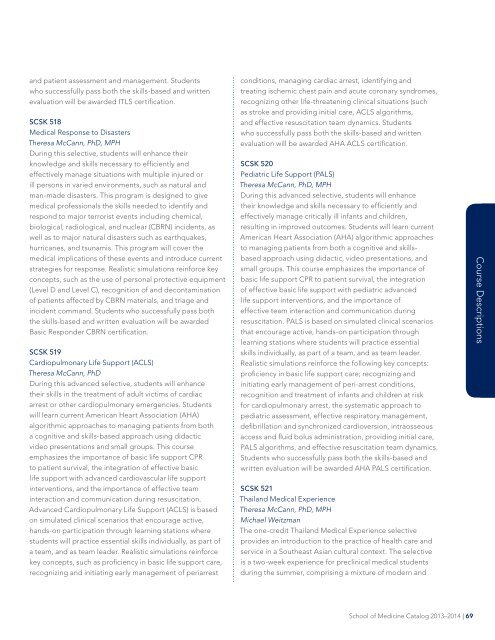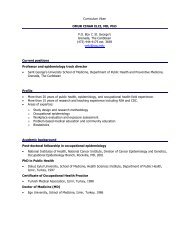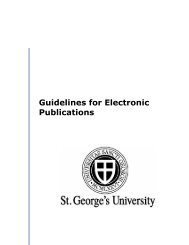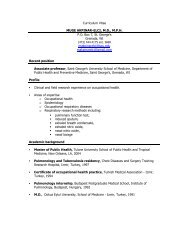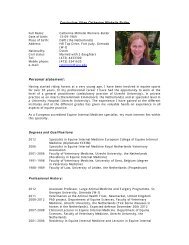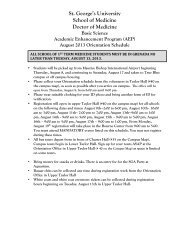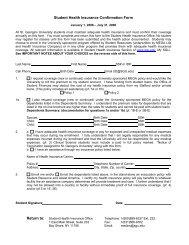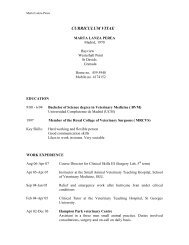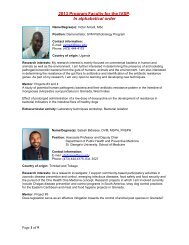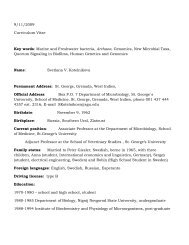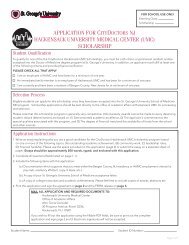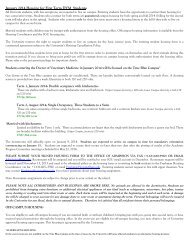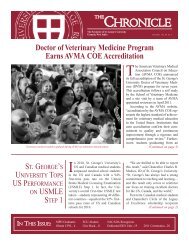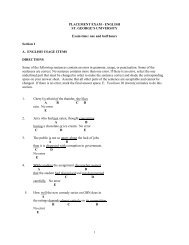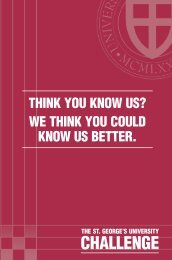SCHOOL OF 2012-2013 - St. George's University
SCHOOL OF 2012-2013 - St. George's University
SCHOOL OF 2012-2013 - St. George's University
You also want an ePaper? Increase the reach of your titles
YUMPU automatically turns print PDFs into web optimized ePapers that Google loves.
and patient assessment and management. <strong>St</strong>udents<br />
who successfully pass both the skills-based and written<br />
evaluation will be awarded ITLS certification.<br />
SCSK 518<br />
Medical Response to Disasters<br />
Theresa McCann, PhD, MPH<br />
During this selective, students will enhance their<br />
knowledge and skills necessary to efficiently and<br />
effectively manage situations with multiple injured or<br />
ill persons in varied environments, such as natural and<br />
man-made disasters. This program is designed to give<br />
medical professionals the skills needed to identify and<br />
respond to major terrorist events including chemical,<br />
biological, radiological, and nuclear (CBRN) incidents, as<br />
well as to major natural disasters such as earthquakes,<br />
hurricanes, and tsunamis. This program will cover the<br />
medical implications of these events and introduce current<br />
strategies for response. Realistic simulations reinforce key<br />
concepts, such as the use of personal protective equipment<br />
(Level D and Level C), recognition of and decontamination<br />
of patients affected by CBRN materials, and triage and<br />
incident command. <strong>St</strong>udents who successfully pass both<br />
the skills-based and written evaluation will be awarded<br />
Basic Responder CBRN certification.<br />
SCSK 519<br />
Cardiopulmonary Life Support (ACLS)<br />
Theresa McCann, PhD<br />
During this advanced selective, students will enhance<br />
their skills in the treatment of adult victims of cardiac<br />
arrest or other cardiopulmonary emergencies. <strong>St</strong>udents<br />
will learn current American Heart Association (AHA)<br />
algorithmic approaches to managing patients from both<br />
a cognitive and skills-based approach using didactic<br />
video presentations and small groups. This course<br />
emphasizes the importance of basic life support CPR<br />
to patient survival, the integration of effective basic<br />
life support with advanced cardiovascular life support<br />
interventions, and the importance of effective team<br />
interaction and communication during resuscitation.<br />
Advanced Cardiopulmonary Life Support (ACLS) is based<br />
on simulated clinical scenarios that encourage active,<br />
hands-on participation through learning stations where<br />
students will practice essential skills individually, as part of<br />
a team, and as team leader. Realistic simulations reinforce<br />
key concepts, such as proficiency in basic life support care,<br />
recognizing and initiating early management of periarrest<br />
conditions, managing cardiac arrest, identifying and<br />
treating ischemic chest pain and acute coronary syndromes,<br />
recognizing other life-threatening clinical situations (such<br />
as stroke and providing initial care, ACLS algorithms,<br />
and effective resuscitation team dynamics. <strong>St</strong>udents<br />
who successfully pass both the skills-based and written<br />
evaluation will be awarded AHA ACLS certification.<br />
SCSK 520<br />
Pediatric Life Support (PALS)<br />
Theresa McCann, PhD, MPH<br />
During this advanced selective, students will enhance<br />
their knowledge and skills necessary to efficiently and<br />
effectively manage critically ill infants and children,<br />
resulting in improved outcomes. <strong>St</strong>udents will learn current<br />
American Heart Association (AHA) algorithmic approaches<br />
to managing patients from both a cognitive and skillsbased<br />
approach using didactic, video presentations, and<br />
small groups. This course emphasizes the importance of<br />
basic life support CPR to patient survival, the integration<br />
of effective basic life support with pediatric advanced<br />
life support interventions, and the importance of<br />
effective team interaction and communication during<br />
resuscitation. PALS is based on simulated clinical scenarios<br />
that encourage active, hands-on participation through<br />
learning stations where students will practice essential<br />
skills individually, as part of a team, and as team leader.<br />
Realistic simulations reinforce the following key concepts:<br />
proficiency in basic life support care; recognizing and<br />
initiating early management of peri-arrest conditions,<br />
recognition and treatment of infants and children at risk<br />
for cardiopulmonary arrest, the systematic approach to<br />
pediatric assessment, effective respiratory management,<br />
defibrillation and synchronized cardioversion, intraosseous<br />
access and fluid bolus administration, providing initial care,<br />
PALS algorithms, and effective resuscitation team dynamics.<br />
<strong>St</strong>udents who successfully pass both the skills-based and<br />
written evaluation will be awarded AHA PALS certification.<br />
SCSK 521<br />
Thailand Medical Experience<br />
Theresa McCann, PhD, MPH<br />
Michael Weitzman<br />
The one-credit Thailand Medical Experience selective<br />
provides an introduction to the practice of health care and<br />
service in a Southeast Asian cultural context. The selective<br />
is a two-week experience for preclinical medical students<br />
during the summer, comprising a mixture of modern and<br />
School of Medicine<br />
Course Descriptions<br />
School of Medicine Catalog <strong>2013</strong>–2014 | 69


